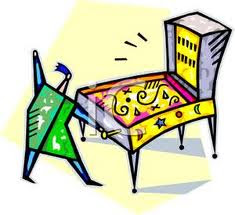I've
had a life-long fascination with words; with their sounds, with their
origins, with their meanings. It amazes me how few people ever take
even a moment to think about the wonder of words. To do so can add
new layers of appreciation and delight to life.
I
owe my love of words to my mother, with whom, as a very young child,
I would play a game we called "Dictionary." We would sit
with the dictionary, taking turns opening it to random pages, then
closing our eyes and putting our index finger on the page. The other
would try to identify and define the word the finger pointed to.
I
am delighted by words which are, in effect, their own definition.
Some are so elementary as to be fascinating when you stop to realize
it: "fly," for example. A "fly" is what it is,
and "fly" is what it does.
Seeking
the background of words can, however, be a trap, in that you set out
in one direction and find yourself wandering off in another. The word
"butterfly," for example, is a spoonerism for what a
butterfly does...it "flutters by," and spoonerism—a
verbal error in which a speaker accidentally transposes the initial
sounds or letters of two or more words—is one of those words the
definition of which is derived from the person with whom it is
associated, in this case a 19th century scholar named W.A.
Spooner, famous for garbling his words. The word for a certain form
of facial hair, sideburns, derived its name from civil war General
Ambrose Burnside, who wore them. And the word "hooker"
derives from another Civil War general, Joseph Hooker. Large numbers
of women, many of them prostitutes, traveled with his troops, and
thus became known as "hookers." (See what I mean about the
ease of getting distracted?)
A
great many two-and-three syllable words contain their definition in
the individual words of which they are comprised, and while not one
person in a thousand considers doing so, looking at them as separate
words gives a new appreciation for them and their meaning: lawnmower,
blackberry, blueberry, foghorn, battleship, gravedigger, peacemaker,
handkerchief, timekeeper, scorekeeper, pastime, bartender, nightclub.
Many
of the words we use have foreign roots which are self-descriptive in
their original language:
parasol
("for sun"), mayday (mispronunciation of "m'aidez:
help me").
The
self-definition of some common words are archaic and thus less
obvious than others: breakfast
(refers to breaking the fast between dinner and dawn), landlord (from
the time when titled "lords" owned large amounts of land
and had control over the people who lived on them).
The
three primary American sports are self-descriptive, of course:
basketball, baseball, football.
I'm
particularly intrigued with words whose pronunciation has evolved to
the point where it totally obscures the word's true meaning or
origins. The despised racial epithet, "the N-word," is in
fact an almost logical result of the historically-acceptable word
"Negro." But through casual repetition and/or rapid
pronunciation, it morphs into the "N-word."
Those
of you who have followed my blogs for some time are already aware
that when it comes to mispronunciation totally hijacking the meaning
of a word, my personal cause célèbre (literally, "famous
case") is "President," and I have dragged out my
soapbox innumerable times to point out that the correct
pronunciation...and the true meaning...of the word is "pre-ZI-dent":
one who presides. Yet I'd bet that 9,999 out of 10,000 have never
made this connection. So, as with so many things in life, I fight my
own little battles and, as with so many of my little battles, lose
them—though I have fun doing so.
A
common philosophical question is "if you were stranded on a
desert island, and could take only one book, which would it be?"
For me, the answer is simple: "a dictionary."
Dorien's
blogs are posted by 10 a.m. Central time every Monday, Wednesday, and
Friday. Please take a moment to check out his website
(http://www.doriengrey.com)
and, if you enjoy these blogs, you might want to check out Short
Circuits: a Life in Blogs (http://bit.ly/m8CSO1
).















